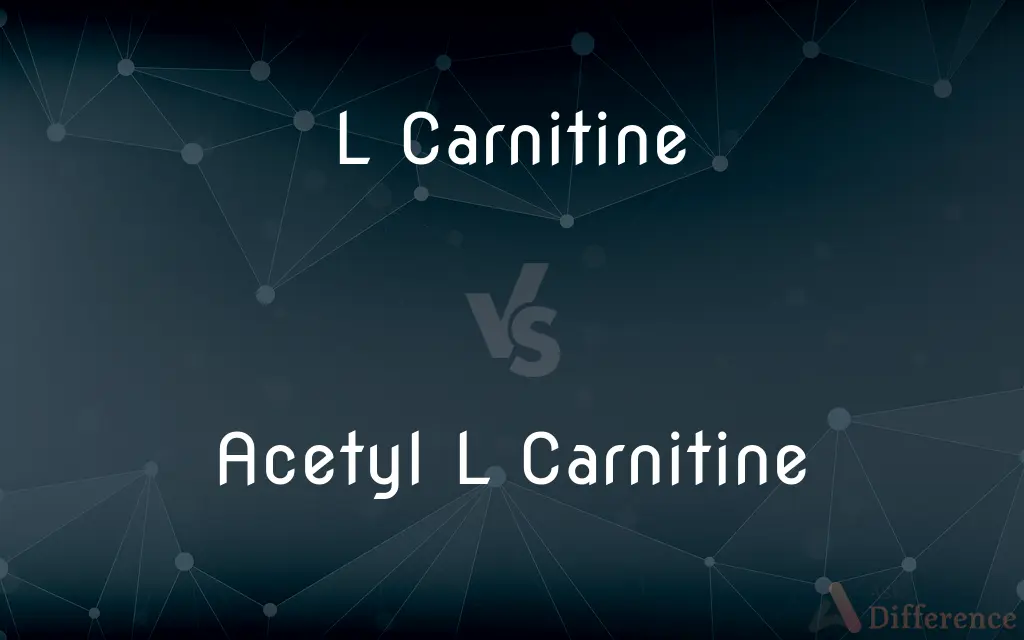L Carnitine vs. Acetyl L Carnitine — What's the Difference?
By Tayyaba Rehman — Published on January 14, 2024
L Carnitine is an amino acid derivative important for energy production in cells, while Acetyl L Carnitine is L Carnitine bound to an acetyl group, which enhances its ability to cross the blood-brain barrier.

Difference Between L Carnitine and Acetyl L Carnitine
Table of Contents
ADVERTISEMENT
Key Differences
Chemical Structure: L Carnitine is a naturally occurring amino acid derivative, known for its role in the transport of fatty acids into mitochondria for energy production. Acetyl L Carnitine, on the other hand, is L Carnitine with an added acetyl group, which alters its function and bioavailability. The acetyl group in Acetyl L Carnitine enhances its ability to cross the blood-brain barrier.
Primary Function in the Body: The main role of L Carnitine is to facilitate the breakdown of fats into energy within the body's cells. Acetyl L Carnitine, while also involved in fat metabolism, is particularly effective in supporting brain health due to its ability to enter the central nervous system more readily.
Health Benefits and Uses: L Carnitine is commonly used to support overall energy levels and is often promoted for weight loss and athletic performance. Acetyl L Carnitine is sought for its potential benefits in cognitive function, memory enhancement, and neurological support, due to its neuroprotective properties.
Bioavailability and Absorption: The added acetyl group in Acetyl L Carnitine improves its absorption and efficacy in the body, particularly in the brain. L Carnitine, while effective in fat metabolism, does not cross the blood-brain barrier as efficiently as Acetyl L Carnitine.
Supplementation and Therapeutic Uses: In supplement form, L Carnitine is often used by athletes and individuals looking to enhance physical performance and energy. Acetyl L Carnitine is more commonly used in the context of cognitive enhancement and for addressing neurological conditions.
ADVERTISEMENT
Comparison Chart
Chemical Structure
Amino acid derivative.
L Carnitine with an added acetyl group.
Primary Function
Facilitates breakdown of fats into energy.
Supports brain health and cognitive function.
Health Benefits
Supports energy levels, weight loss, and physical performance.
Enhances cognitive function and neurological health.
Bioavailability
Effective in cellular energy production.
Enhanced ability to cross the blood-brain barrier.
Supplementation Use
Popular among athletes and for physical performance.
Used for cognitive enhancement and neurological support.
Compare with Definitions
L Carnitine
L Carnitine is commonly used for weight management and sports performance.
L Carnitine supplementation is a part of many weight loss programs.
Acetyl L Carnitine
It has an added acetyl group, which allows it to cross the blood-brain barrier.
Acetyl L Carnitine's ability to enter the brain makes it effective for neurological support.
L Carnitine
L Carnitine is a nutrient and dietary supplement that aids in fat metabolism.
Athletes often take L Carnitine supplements to improve endurance and burn fat.
Acetyl L Carnitine
Acetyl L Carnitine is used for memory improvement and neuroprotective benefits.
Studies suggest Acetyl L Carnitine may be beneficial in age-related memory decline.
L Carnitine
L Carnitine supports overall cardiovascular health and muscle function.
People with heart conditions sometimes take L Carnitine supplements.
Acetyl L Carnitine
It assists in the production of acetylcholine, an important neurotransmitter.
Acetyl L Carnitine supplementation can help in maintaining healthy neurotransmitter levels.
L Carnitine
L Carnitine helps transport fatty acids into mitochondria for energy production.
L Carnitine is crucial for efficient cellular energy metabolism.
Acetyl L Carnitine
Acetyl L Carnitine is a form of L Carnitine that supports brain and nerve health.
Acetyl L Carnitine supplements are often recommended for cognitive enhancement.
L Carnitine
It is naturally produced in the body and can be supplemented for enhanced energy.
L Carnitine is added to many energy drinks for its metabolic benefits.
Acetyl L Carnitine
Acetyl L Carnitine is effective in addressing cognitive and neurological disorders.
Acetyl L Carnitine is researched for its potential in treating Alzheimer’s disease.
Common Curiosities
What does Acetyl L Carnitine do?
Enhances cognitive function and crosses the blood-brain barrier.
Is Acetyl L Carnitine good for the brain?
Yes, it's known for its neuroprotective and cognitive benefits.
Can L Carnitine help with weight loss?
Yes, it aids in fat metabolism and can support weight loss.
Is Acetyl L Carnitine naturally produced in the body?
Yes, but in smaller quantities compared to L Carnitine.
What makes Acetyl L Carnitine different from L Carnitine?
The acetyl group, which enhances its ability to support brain health.
What is L Carnitine?
An amino acid derivative important for energy production.
Can I get L Carnitine from food?
Yes, it's found in meat, fish, and dairy products.
What are the benefits of Acetyl L Carnitine for the elderly?
It can help with cognitive function and age-related neurological health.
How does L Carnitine work in the body?
It transports fatty acids into mitochondria for energy production.
Does L Carnitine have side effects?
It's generally safe but can cause nausea or stomach upset in some.
Can Acetyl L Carnitine improve memory?
Yes, it's associated with memory enhancement.
Who should take L Carnitine supplements?
Athletes and individuals seeking to improve energy and physical performance.
Is Acetyl L Carnitine used in treating neurological diseases?
It's being researched for potential benefits in conditions like Alzheimer’s.
Should I take L Carnitine or Acetyl L Carnitine for fitness?
L Carnitine is more suited for physical performance and energy.
How does Acetyl L Carnitine affect neurotransmitters?
It assists in the production of acetylcholine, a key neurotransmitter.
Share Your Discovery

Previous Comparison
AM Radio vs. FM Radio
Next Comparison
14k Gold vs. 18k GoldAuthor Spotlight
Written by
Tayyaba RehmanTayyaba Rehman is a distinguished writer, currently serving as a primary contributor to askdifference.com. As a researcher in semantics and etymology, Tayyaba's passion for the complexity of languages and their distinctions has found a perfect home on the platform. Tayyaba delves into the intricacies of language, distinguishing between commonly confused words and phrases, thereby providing clarity for readers worldwide.











































